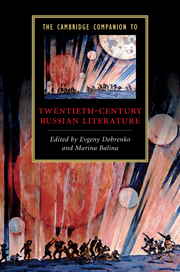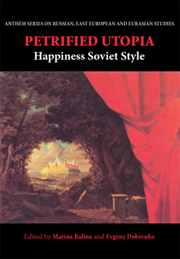24 results
Pomnit΄ po nashemu: Sotsrealisticheskii istorizm i blokada Leningrada. By Tatiana Voronina. Moscow: Novoe literaturnoe obozrenie, 2018. 273 pp. ₽312, hard bound.
-
- Journal:
- Slavic Review / Volume 79 / Issue 2 / Summer 2020
- Published online by Cambridge University Press:
- 10 August 2020, pp. 478-479
- Print publication:
- Summer 2020
-
- Article
- Export citation
Chapter 10 - (Auto)Biographical prose
-
-
- Book:
- Russian Literature since 1991
- Published online:
- 05 November 2015
- Print publication:
- 12 November 2015, pp 188-206
-
- Chapter
- Export citation
The Russian Nanny, Real and Imagined: History, Culture, Mythology. By Steven A. Grant. Washington, D.C.: New Academia Publishing, 2012. xii, 496 pp. Notes. Bibliography. Index. Illustrations. $40.00, hard bound. $30.00, paper.
-
- Journal:
- Slavic Review / Volume 73 / Issue 4 / Winter 2014
- Published online by Cambridge University Press:
- 20 January 2017, pp. 951-952
- Print publication:
- Winter 2014
-
- Article
- Export citation

The Cambridge Companion to Twentieth-Century Russian Literature
-
- Published online:
- 28 May 2011
- Print publication:
- 17 February 2011
Frontmatter
-
- Book:
- The Cambridge Companion to Twentieth-Century Russian Literature
- Published online:
- 28 May 2011
- Print publication:
- 17 February 2011, pp i-xxviii
-
- Chapter
- Export citation
Index
-
- Book:
- The Cambridge Companion to Twentieth-Century Russian Literature
- Published online:
- 28 May 2011
- Print publication:
- 17 February 2011, pp 289-298
-
- Chapter
- Export citation
9 - Prose after Stalin
-
-
- Book:
- The Cambridge Companion to Twentieth-Century Russian Literature
- Published online:
- 28 May 2011
- Print publication:
- 17 February 2011, pp 153-174
-
- Chapter
- Export citation
Part One - Utopics
-
- Book:
- Petrified Utopia
- Published by:
- Anthem Press
- Published online:
- 05 March 2012
- Print publication:
- 01 July 2009, pp 1-2
-
- Chapter
- Export citation

Petrified Utopia
- Happiness Soviet Style
-
- Published by:
- Anthem Press
- Published online:
- 05 March 2012
- Print publication:
- 01 July 2009
5 - ‘It's Grand to be An Orphan!’: Crafting Happy Citizens in Soviet Children's Literature of the 1920s
- from Part Two - Realities
-
-
- Book:
- Petrified Utopia
- Published by:
- Anthem Press
- Published online:
- 05 March 2012
- Print publication:
- 01 July 2009, pp 99-114
-
- Chapter
- Export citation
Frontmatter
-
- Book:
- Petrified Utopia
- Published by:
- Anthem Press
- Published online:
- 05 March 2012
- Print publication:
- 01 July 2009, pp i-iv
-
- Chapter
- Export citation
Part Three - Locations
-
- Book:
- Petrified Utopia
- Published by:
- Anthem Press
- Published online:
- 05 March 2012
- Print publication:
- 01 July 2009, pp 187-188
-
- Chapter
- Export citation
Acknowledgments
-
- Book:
- Petrified Utopia
- Published by:
- Anthem Press
- Published online:
- 05 March 2012
- Print publication:
- 01 July 2009, pp ix-x
-
- Chapter
- Export citation
Index
-
- Book:
- Petrified Utopia
- Published by:
- Anthem Press
- Published online:
- 05 March 2012
- Print publication:
- 01 July 2009, pp 301-307
-
- Chapter
- Export citation
Part Two - Realities
-
- Book:
- Petrified Utopia
- Published by:
- Anthem Press
- Published online:
- 05 March 2012
- Print publication:
- 01 July 2009, pp 97-98
-
- Chapter
- Export citation
List of Contributors
-
- Book:
- Petrified Utopia
- Published by:
- Anthem Press
- Published online:
- 05 March 2012
- Print publication:
- 01 July 2009, pp xi-xiv
-
- Chapter
- Export citation
Introduction
-
-
- Book:
- Petrified Utopia
- Published by:
- Anthem Press
- Published online:
- 05 March 2012
- Print publication:
- 01 July 2009, pp xv-xxiv
-
- Chapter
- Export citation
Petrified Utopia
-
- Book:
- Petrified Utopia
- Published by:
- Anthem Press
- Published online:
- 05 March 2012
- Print publication:
- 01 July 2009, pp xxv-xxvi
-
- Chapter
- Export citation
Contents
-
- Book:
- Petrified Utopia
- Published by:
- Anthem Press
- Published online:
- 05 March 2012
- Print publication:
- 01 July 2009, pp v-vi
-
- Chapter
- Export citation
Notes
-
- Book:
- Petrified Utopia
- Published by:
- Anthem Press
- Published online:
- 05 March 2012
- Print publication:
- 01 July 2009, pp 263-300
-
- Chapter
- Export citation

